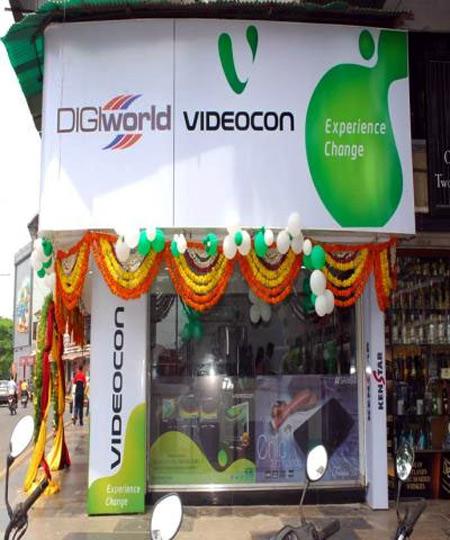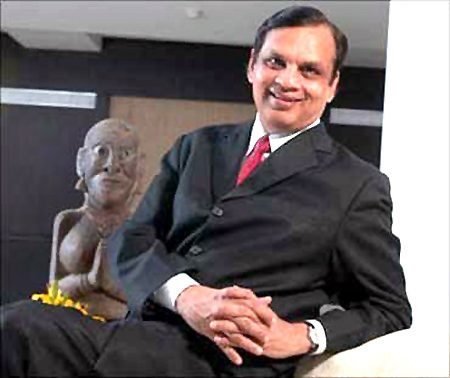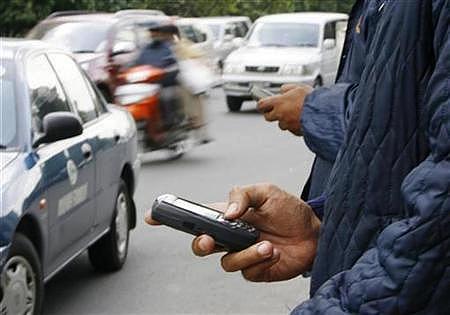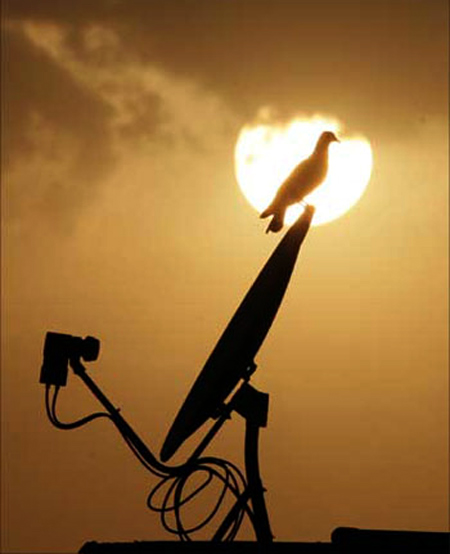Abhineet Kumar in Mumbai
Among the five companies that bought spectrum in the recent auction was Videocon Telecommunications.
A fully owned subsidiary of consumer electronics behemoth Videocon Industries , the company bought spectrum for six circles (Bihar, Haryana, Gujarat, Madhya Pradesh, Uttar Pradesh East and Uttar Pradesh West) worth Rs 2,221 crore. This will actually reduce Videocon's footprint.
It had got spectrum for 21 of the 22 telecom circles in the country in 2008, but that spectrum sale has been annulled by the Supreme Court; so, its circles, after the current auction, will come down from 21 to six.
Amongst the circles Videocon has exited, as of now, includes the populous but congested and expensive circle of Mumbai.
Of course, it could bid for these circles when spectrum is auctioned again. Telecom Minister Kapil Sibal has indicated that the next auction will happen before the financial year ends on March 31, 2013.
In the debate whether spectrum was over- priced or not, the focus seems to have shifted from Videocon's telecom gamble.
...
Videocon's big telecom gamble
In 2008, when Videocon entered telecom, it was a sunrise sector.
There was a large market left to conquer, the tariffs were steady ( the last price war had taken placed many years ago when Reliance Infocomm had entered the market with its Monsoon Hungama offer), incumbents were complacent and profits were healthy. Much has changed since then.
Notably, tariffs have plummeted, debts have risen and profits have slumped. Immense negative sentiment pervades the sector. So, why has Videocon reentered the sector, and with lesser spectrum?
What queers the pitch is that Videocon's entry in 2010 didn't set the market afire. Its share of the 671.6 million connections is just 0.6 per cent.
...
Videocon's big telecom gamble
The Cellular Operators' Association of India no longer publishes the average revenue per user of its members.
But, it was reported that in the January- March 2011 quarter, Videocon's monthly ARPU was a meagre Rs 8.5, less than other newcomers like Unitech Wireless (Rs 39), Etisalat DB (Rs 26.75) and S Tel (Rs 25.99), and hugely below the industry average of Rs 118.
What went wrong? Videocon had launched its service in March 2010 in Chennai.
In a press release issued at that time, it had said that it plans to have the fastest rollout in the sector, one that will cover 100 cities/ towns over the next 100 days.
The group, it added, would spend Rs 14,000 crore 9Rs 140 billion) on mobile telephony over the next three years. Its target was to reach 100 million users within three years.
...
Videocon's big telecom gamble
Image: Videocon Chairman Venugopal Dhoot.Big plans
That was also the time when Videocon launched its handsets.
The Videocon brand, the release added, had touched 160 million people in the last 24 years, and, it was implicit, the company would leverage that base of consumers to expand its mobile business.
"Videocon will leverage the group's established brand equity and vast retail reach, synergies of an integrated product portfolio and combine that with best of breed partners to offer compelling services," Videocon Chairman Venugopal Dhoot was quoted as saying in the release.
Giving a glimpse of the strategy, the release said Videocon will set up eight centres across the country where "customers will be able to interact with the ( company's) representatives in 15 different languages". Videocon would leverage the group's distribution network of over 1,000 retail outlets, including Planet M, Next and Digiworld stores, to market the service.
A campaign too was launched with the punchline, pakdo life kaa har signal ( catch life's every signal). But the clincher was the promise of a tariff of below 1 paisa (per pulse).
...
Videocon's big telecom gamble
For the first few months, things seemed to be going according to plan. In August 2010, Dhoot said that he was looking to offload 26 per cent in Videocon Telecommunications to a foreign company.
"We are looking for a total valuation of Rs 15,000 crore (Rs 150 billion)," he had said. Reports had suggested that Dhoot was in negotiations with South Korea's SK Telecom, after negotiations with UAE's Etisalat and Turkey's Turkcell had failed.
In spite of the best plans made by Videocon and others, it soon came down to a price war. In the absence of any differentiation, the newcomers started to offer rockbottom prices. The incumbents responded by dropping tariffs.
The sector began to bleed. Consumer acquisition at any cost became the name of the game. Driven to desperation, on March 9, 2011, Loop Telecom made an offer in the Supreme Court to put up its licences for 21 circles along with spectrum for auction by the government. Any amount that the government gets over and above the Rs 1,454 crore (rs 14.54 billion) that Loop Telecom paid, the company said, it was free to keep.
The final blow came in February this year when the Supreme Court said the government should cancel all telecom licences handed out in 2008, and the spectrum that came with them, when Andimuthu Raja was the telecom minister, over alleged impropriety in awarding the licences on the first- come, firstserved basis.
...
Videocon's big telecom gamble
Hurdles ahead
The business scenario hasn't improved since then. On the other hand, spectrum has become much more expensive. In 2008, pan- India spectrum could be bought for Rs 1,658 crore ( for 4.4 MHz, which could later be raised to 6.2 MHz).
The price has now been bumped up to Rs 14,000 crore (for 5 MHz). This has made the business case tougher.
On the positive side, one could argue that there's still a lot of upside for growth left in the market.
Though there are over 670 million connections, mobile penetration is still 50 per cent or so. ( The additional connections can be explained by the popularity of dual connections on the same handset and inactive consumers). But nobody knows how soon pricing power will return to the industry.
...
Videocon's big telecom gamble
Photographs: Reuters.
So, why is Videocon interested? Telecom analysts are puzzled.
Sunil Tirumali, an analyst at Credit Suisse, had said before the auction: "Videocon's aggressive participations should come as a surprise."
While Videocon is tightlipped about its future plans at this stage, analysts say it will at best become a regional player in the sector.
With spectrum only in six circles, the company may have to shut down its services in 10 out of the 16 circles, where it was operating before the cancellation of licences, says Vivekanand Subbaraman, telecom analyst at foreign brokerage Philip Capital.
Making money in a mature market will be a challenge, so will be fending off competition from bigger players who can offer 3G services.
...
Videocon's big telecom gamble
"Videocon will have to compete with GSM players who can offer 3G data service; and, in the future, there will be intense competition from the 4G data service providers," says Subbaraman, adding roping in a foreign partner without adequate revenue base wont be easy either.
"So I dont know how they are going to make money." If Videocon wants to leave an impact in the market, it needs to invest a lot of money. But the group is known to be stretched financially.
Videocon's books now have a debt burden of Rs 27,300 crore (Rs 273 billion) compared to Rs 6,300 crore (Rs 63 billion) in 2006- 07, and it is growing at 30 per cent annually.
The purchase of spectrum actually won't be a huge drain on the group's resources.
The government has agreed that it will adjust Rs 1500 crore (Rs 15 billion) that Videocon had paid for spectrum in 2008 but lost in the February order of the Supreme Court against the payment due after the current auction.
...
Videocon's big telecom gamble
Thus, though Videocon has bought spectrum worth Rs 2,221 crore (Rs 22.21 billion), all it needs to pay the government is Rs 721 crore (rs 7.21 billion).
And, out of that, it has the option to pay only one-third upfront and the rest in installments over 10 years, though with interest of 9 per cent per annum.
Before the auction, there was speculation that Videocon's spectrum will soon end up with Reliance Industries.
A few days before submitting the application for spectrum auction, Dhoot had said that he had sought advice from Reliance Industries Chairman Mukesh Ambani on bidding for 2G spectrum. Something similar has indeed happened in the past.
...
Videocon's big telecom gamble
Photographs: Reuters.
In June 2010, Reliance Industries acquired 4G broadband spectrum from Infotel Broadband for $2.7 billion (Rs 12,848 crore) within hours of the company emerging as the sole winner for the spectrum.
But Reliance Industries needs 2G spectrum to run voice services. That's perhaps why there has been speculation that it will buy out Videocon Telecommunications.
But with only six circles, it is not sure how much Reliance Industries may be interested. Also, it is now being said that Reliance Industries may be interested in the highly- efficient 700 MHz band, rather than Videocon's spectrum in the 1,800 MHz band. The enigma continues.
Its first innings failed to ring a bell with consumers, but the company is looking to start afresh, although at a much smaller scale. What is its game plan?












article